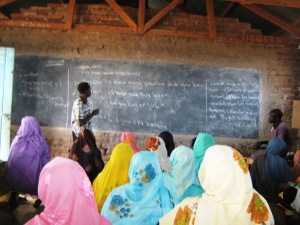Volume 1, Issue 4-5 / March-April 2009
A Darfurian community initiative to educate women in English has already had remarkable positive impacts, but lacks support from humanitarian agencies.

In September 2008, the Darfurian community initiated an ambitious project to teach English to the women of their community. The idea arose after several young men realized that most Darfurian women were unable to communicate in English.
Fared and Khanis both arrived in Kakuma Refugee Camp from Darfur in 2007. Soon after their arrival, they joined the IRC (International Rescue Committee) Adult Education Classes. They successfully completed the beginners, intermediate, and advanced classes in June 2008. Back in Sudan, Fared had attended the Faculty of Art in Khartoum University of Juba, where he graduated in 2005.
As Fared and Khamis pursued their own education, they witnessed how their women struggled to communicate with others in the market place, meetings, and food distribution centres. They realized that they possessed knowledge their women did not, and that this knowledge could be shared more effectively.
They decided to devote their knowledge, energy, and time to teaching Darfurian women English. They teach on a voluntary basis because they feel they are all one people and the problems of their women are also their own. According to the two teachers, their vision is to empower their women with English knowledge and skills so as to help them communicate effectively.
Two classes were set up: an introductory class for those who know no English; and an intermediary class for those with a little knowledge. Currently, the classes are held four times each week (Monday, Tuesday, Thursday, and Friday) in the afternoon—a schedule that may change occasionally according to teacher availability.
When asked where they get materials to run the classes, the answer from one teacher was remarkable. Chalk is supplied by Darfurian primary school students who ask their teachers for left-over chalk to be donated to the women’s English program. For instruction materials, teachers use the black board in one classroom of Polotaka Primary School. They requested permission from the director of the school to use the classroom every afternoon.
Both teacher use notes from various English courses they attended in the past, and borrow English books from Darfurian students attending camp schools. Women learners purchase their own notebooks and pens. Each participant offers a small contribution to help keep the project running.
Positive impacts
Considering the efforts invested in launching and sustaining the project so far, both participants and community members are happy with the outcome. Women attending the classes are proud to share what the project has brought them. As one woman says with a smile and a proud look, “I can now say, ‘I am going to market.’” Today, she can make herself understood in English with only a little grammatical error.
The program has already witnessed positive achievements among students. One teacher says that many of their women feel more confident and courageous in joining or applying for various courses, something they had never done before. Several students have now applied for counseling courses with JRS (Jesuit Refugee Services) and English Courses with WTK (Windle Trust Kenya).
Teachers and community members are proud that many of their women are now able to speak English better than before. After witnessing the women’s success, men also started joining the classes in January of this year.
Lack of support from humanitarian agencies
Although the program has clearly had a positive impact on the community, much remains to be done. Teachers report that they are in need of boxes of chalk, notebooks, pens, and proper reading and teaching materials. Teachers would like to further their English studies so as to increase their knowledge package.
Fared reports that the group requested assistance in the form of pens, notebooks, and other useful materials from LWF (Lutheran World Federation) in September 2008, just after starting their classes. LWF promised to visit them during their classroom session, but they never showed up. Fared says that the teachers and students felt “despised and disappointed,” and so decided not to approach LWF for assistance again.
They have not approached UNHCR for support. Fared says that they considered the possibility, but realized it would be almost impossible to gain entrance to the UNHCR offices without an appointment slip. As they have no way of contacting UNHCR officials to request an appointment slip, they felt it would be a waste of time to try to seek UNHCR support.
Support self-reliance and community initiatives
One of the objectives of UNHCR for 2009 was to ensure that the office will “support self-reliance to strengthen livelihoods for women and youth, build skills, and prepare refugees for repatriation and reintegration” (UNHCR Global Appeal 2008-2009, p. 148). The Darfurian Community’s English-education project for women presents an ideal opportunity to support self-reliance and strengthen livelihoods through a genuinely community-based approach. Unfortunately, the program has not been encouraged or assisted by either NGOs or UNHCR in Kakuma.
It is touching and impressive to see what the Darfurian community has sought to do for their women. Their endeavor reminds us that each individual has talents that can be used and explored for the betterment of the people around us, especially our mothers, sisters, and daughters.
This innovative educational initiative is already having a positive impact on the community. But if the group is not assisted and encouraged, the program may soon die out. The Darfurian education initiative needs to be recognized and supported by the NGOs in order to help teachers and students secure the future of their program.
Sources Cited:
UNHCR Global Appeal 2008-2009.
